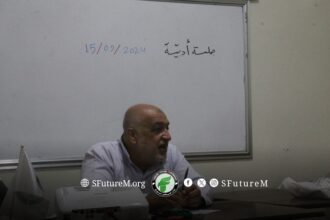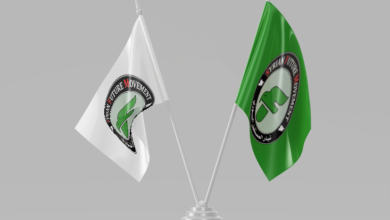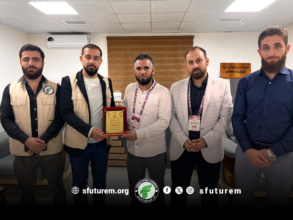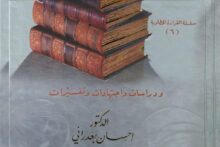Why Won’t Al-Julani Step Down?
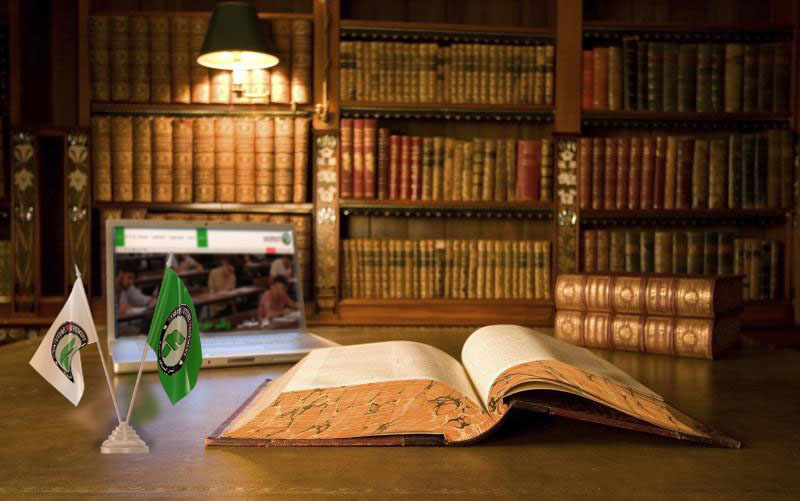
Last Friday, March 29, 2024, anti-Al-Julani protests broke out, encompassing the central area of Idlib city, the stronghold of Hay’at Tahrir al-Sham, and its powerful force, as well as cities under its control, including “Binnish, Sarmada, Harem, Jisr al-Shughur, and Kafr Takharim,” in addition to “Al-Atarib and Abin Semaan” in western Aleppo. The spark for these protests was the torture of detainees in the prisons of “Hay’at Tahrir al-Sham,” which escalated with the killing and disappearance of a member from the “Ahrar al-Sham” faction, led by “Abu Saleh Tahhan.” It was later revealed that one of its members known as “Abdul Qader Al-Hakeem” or “Abu Ubaida Tal Hadiya” was tortured to death in September 2023 within the group’s prisons, without informing his faction or his family of his death.
These protests continue for the fifth week, with areas under “Hay’at Tahrir al-Sham” control witnessing anti-group demonstrations since February 25. The primary demand of the protesters is the overthrow of Abu Mohammad al-Julani. Hay’at Tahrir al-Sham has previously faced two phases of peaceful protests, which ended without fulfilling their demands:
- The first phase: Occurred from the early months of 2016 until the beginning of 2017 (290 days), in Maarat al-Numan following Jabhat al-Nusra’s attack on Division 13, which was stationed in the city.
- The second phase: Took place in mid-last year, 2023, and lasted several months until it subsided.
Today, the Idlib and Aleppo countryside demonstrations can be considered the third phase of peaceful protests against Hay’at Tahrir al-Sham. In this analysis, we attempt to understand the reasons behind Al-Julani’s refusal to step down and resign despite the existence of a peaceful movement opposing his presence, through three main reasons:
The first reason, International Desire:
Some reports indicate an international preference for “Ahmad Hussein Al-Sharaa,” known as “Abu Mohammad Al-Julani,” making his presence a regional and international interest. Despite Jabhat al-Nusra being designated as a terrorist organization, its backers in the former MOM and MOC operation rooms, supported by the Friends of the Syrian People, covertly supported Jabhat al-Nusra through a battalion that was nominally part of the Free Syrian Army but was actually aligned with Jabhat al-Nusra at that time. Jabhat al-Nusra was then considered a significant military force beneficial to some intelligence agencies among the Friends of the Syrian People, as well as an interest in the spread of Al-Qaeda in Syria, highlighted by the following regional and international patronage of Jabhat al-Nusra:
- Qatar, as reported by “The Times” on June 4, 2021, involved Qatari businessmen and banks in money laundering operations to financially support Jabhat al-Nusra in Syria (before it became Hay’at Tahrir al-Sham), which was denied by Qatar’s Government Communication Office. However, Qatar can be considered the only state negotiating on behalf of Jabhat al-Nusra, as evidenced by:
A. In late 2012, Jabhat al-Nusra kidnapped American journalist Theo Curtis, and in 2014, a deal was made with a ransom of 30 million dollars paid by Qatar to Jabhat al-Nusra.
B. In 2013, Jabhat al-Nusra kidnapped 13 nuns from the town of Maaloula near Damascus, and in addition to releasing prisoners in Lebanon, Jabhat al-Nusra also demanded sixteen million dollars, which was arranged in 2014 with Qatari sponsorship.
C. In 2015, Qatari mediation facilitated the release of 16 Lebanese soldiers kidnapped by Jabhat al-Nusra, with one of the conditions being a financial ransom alongside the release of prisoners close to Jabhat al-Nusra and ISIS, which was indeed achieved with Qatari sponsorship.
Additionally, Qatar’s soft support appears to also involve promoting Jabhat al-Nusra’s narrative and presenting Al-Julani through Al Jazeera in an episode of “Today’s Meeting” on December 19, 2013, and another interview with Ahmad Mansour on “Without Borders,” aired in two episodes in May 2015, portraying him as a prominent Syrian leader. This soft Qatari support is likely based on an American desire, in addition to a Gulf trend to play various roles in the region to maintain an intelligence presence in the Arab world. - Turkey: This is evidenced by the political support since the Sochi Agreement in 2018 between Turkey and Russia, which included the area controlled by Hay’at Tahrir al-Sham under the de-escalation agreement, as well as support for the Salvation Government with electricity and other logistics, in addition to cooperation with it through the Bab al-Hawa crossing, which the Salvation Government affiliated with Hay’at Tahrir al-Sham controls today.
- The United States: Some private sources reveal that factions within the United States now consider Abu Muhammad al-Julani a jihadist figure who has transformed Al-Qaeda and Salafi Jihadism from a global project into a national one. Through his leadership and control over Idlib province, he has managed to become the pace-setter for Salafi Jihadism. Consequently, the United States, through the CIA, presents al-Julani as an important figure for American national security who must be supported.
- Russia: There is an overt conflict between Russia and Hay’at Tahrir al-Sham, but some informed sources suggest that Russia invests in Hay’at Tahrir al-Sham. It is not in Russia’s interest for the moderate opposition supported by Turkey to expand in the northern regions, making it easy to label the Syrian opposition as terrorists due to the presence of Hay’at Tahrir al-Sham, which is designated as a terrorist organization, at any political or military juncture.
Second Reason, Ideological Structure:
In addition to external factors for Abu Muhammad al-Julani’s continuance and refusal to relinquish his position, there are internal factors dependent on the ideological and theoretical structure that al-Julani’s project carries. The Islamic political thought within Hay’at Tahrir al-Sham relies on the traditional perspective of authority being the outcome of one of two factors beyond inheritance:
The first: The agreement of the people of resolution and contract on the executive authority, where “consent” is the primary element in the legitimate political allegiance, meaning the right to choose and voluntarily contract, which is an agreement of satisfaction and selection between two parties: the first party being the nation through its representatives of the people of resolution and contract, and the second party the one assuming governance. Several political jurists, including Al-Mawardi, a prominent political jurist, have discussed who the people of resolution and contract are: some say “those of choice,” others “those of jurisprudence,” and yet others “those in command” (Al-Ahkam Al-Sultaniyya by Al-Mawardi, p. 23).
The second: Overcoming through military force, in his famous book “The Ordinances of Governance and the Religious States,” Imam Al-Mawardi, the chief theorist of overcoming, presented a new theoretical effort beyond his predecessors. He sought to find a political settlement he believed would preserve the stability and unity of the state then represented by the symbolism of the Abbasid Caliph, while also granting a form of legitimacy to the dominant rulers. He discussed two types of emirate over territories and countries: the Emirate of Sufficiency, which arises from a contract with the Caliph by choice, endowed with specific authorities, and, as Al-Mawardi expressed, includes limited work and known oversight; and the second type, the Emirate of Seizure: This type of emirate is established out of necessity, where the prince seizes the lands by force, then, by the fact of the matter, the Caliph accredits his emirate to him, delegating the management and policy of these lands to him, making the prince who seized power; the actual ruler, absolute in policy and management, while the Abbasid Caliph remains the nominal authority as a symbol uniting the Caliphate and the state. Al-Mawardi justifies this state by arguing that recognizing the authority of the conqueror preserves Sharia laws and guards the religious decrees, moving from corruption to correctness, from prohibition to permissibility, and that with seizure and necessity, what was prohibited in the tradition of sufficiency and choice becomes permissible. This calls for obedience to the dominant prince, pushing against opposition to him, due to the difference between the conditions of capability and incapacity. Al-Mawardi justified this by stating that necessity eliminates what lacks from the conditions of capability, and that which achieves public interests relaxes its conditions over the conditions of private interests.
Indeed, the majority of Imams and jurists of Islamic political thought see the necessity of obeying the dominant ruler who has managed to seize control through force or coercion and whose authority has become a fact, and among the most prominent advocates of this direction is Imam Al-Shafi’i, who is quoted as saying: “Anyone who overcomes the caliphate by the sword until he is named Caliph, and the people unite upon him, then he is the Caliph” (Abu Bakr Ahmad bin Hussein Al-Bayhaqi, Manaqib Al-Shafi’i, p.448), and similarly, Imam Ahmad bin Hanbal emphasized the obligation of “hearing and obedience to the leaders, both the righteous and the wicked, and to the one who overcame them with the sword until he became Caliph and was named Commander of the Faithful” (Abu Abdullah Ahmad bin Hanbal Al-Shaybani, Usul Al-Sunnah, p. 42).
Therefore, the ideological and theoretical imagination carried by Abu Muhammad al-Julani does not see the principles of the modern nation-state as a legitimate path; rather, it relies on a Salafi Islamic narrative that adopts the concept of dominance, or allegiance to the people of resolution and contract. From here, we understand how al-Julani was able to establish the Shura Council he founded to represent the people of resolution and contract, who represent the elite with an opinion in the region, including scholars who were accepted, in addition to military leaders who pledged allegiance to al-Julani. And as for dominance, Hay’at Tahrir al-Sham extends its military control in Idlib and its countryside, and thus, whether through the path of the people of resolution and contract, or through force and dominance, Abu Muhammad al-Julani is the legitimate leader who has no right to remove a shirt that God has dressed him in (a saying attributed to Caliph Uthman bin Affan).
The third reason, seemingly minor details collectively considered significant:
Several factors could be preventing Al-Julani from relinquishing his leadership of Hay’at Tahrir al-Sham, including:
- Internal conflicts within Hay’at Tahrir al-Sham could be a primary factor deterring Al-Julani from stepping down. These conflicts might include splits, accusations of betrayal, and arrests, making Al-Julani’s role as a central leadership figure essential to preventing the dissolution of the group’s cohesion, especially in the absence of another charismatic leadership figure of Al-Julani’s stature within the organization’s structure.
- External pressures from international security and military wings, given Syria is currently a focal point of international intelligence interest. Therefore, unresolved issues with these entities cannot be left midway, especially as Turkey prepares for a summer battle against the QSD organization, Russia seeks to avoid escalation in Syria amidst its engagement in the Ukraine war, and the Syrian regime, already burdened by sanctions and economic blockade, appears not to require further territorial control. Additionally, Iran does not view the Idlib area as a center of influence worth a political or economic gain, being preoccupied with the aftermath of the Al-Aqsa flood. Thus, maintaining the status quo without changes while completing other security dossiers is seen as an external security and military necessity.
- Security investigations and accusations directed at Al-Julani and other members of the group might also prevent him from stepping down. He would either withdraw, thereby facing both international and domestic prosecution, or confront and continue maintaining his position, which shields him from such pursuits.
- Security risks, such as threats to Al-Julani’s personal safety, with a bounty of 10 million dollars on his head, ensure his continuance in his role, presenting credentials to be a leader in Syria’s future.
- Al-Julani’s desire to be seen as the Sunni “Hezbollah” in Syria, as he has stated in some of his private meetings, indicates he is not considering abandoning the project he carries.
- The ideological project of Hay’at Tahrir al-Sham, focused on preserving a Sunni “Salafi” bloc, is deemed a religious undertaking that cannot be compromised for secular, nationalistic, democratic, leftist, or other projects.
Conclusion:
It’s important to note that these reasons might not necessarily apply exclusively to Al-Julani or any other individual under current circumstances. The political, military, and social context Al-Julani finds himself in could significantly impact his decisions as well. However, the three phases of protests against Al-Julani appear to differ: while the first phase resulted from his dispute with Division 13 of the Free Syrian Army, and the second phase from his disagreement with the Liberation Party, today’s phase involves, to some extent, the civil society itself. This means Al-Julani is now directly confronting the street or a portion of it, leaving him between two choices:
1- To use the street against the street, or to use violence against the demonstrations, leading the area into a phase of conflict that won’t easily end, especially as Al-Julani’s project would then lose its popular depth, which he aims to use as a protective societal base for his future political prospects.
2- To let the street tire itself out or to find a specific way to appease and silence it—especially after his failed battles against the Syrian regime to silence the street. Yet, we’ve seen the protests’ fervor and their expansion week after week. Therefore, Al-Julani might leave the protest dynamic to unfold on its own without positive or negative interference, betting on the protesters’ weariness. However, with the possibility that leaving the street unaddressed could lead to the broadening scope of demonstrations, bringing out the fearful and hesitant, and attracting interest-driven individuals, in addition to the potential for some external parties to exploit the protests; Al-Julani would face a stage requiring him to reposition himself within the scene. This repositioning would involve withdrawing Abu Mohammad Al-Julani from leading the organization but finding a way to keep him within the decision-making circle, possibly by handing him the military or security portfolio specifically, directed primarily at protecting his territory’s borders, thereby distancing him from the protesters’ chants while keeping him involved in security and military files with external powers.
Finally, betting on the weariness of the demonstrators is an uncertain risk. Given the international protection for Al-Julani, the possibility of his removal seems off the table; otherwise, signs of such an outcome would have been evident. Moreover, democratic thinking is unlikely to resonate with Al-Julani, who sees himself as a legitimate leader. Therefore, it would be appropriate to regard “Ahmad Hussein Al-Shara” as one of the leadership figures emerging from the Syrian conflict and to deal with him as a leader who could play a role in Syria’s future. Leveraging his desire for power to moderate the violent jihadist ideology through political participation, within certain constraints, might not be deemed legitimate by him, but he would possess the religious decree that justifies it based on reality, necessity, and public interest.
Jomaa Mohamad Laheep
Scientific Office
Research and Studies Department
Studies
Syrian Future Movement (SFM)
References:
(1) جبهة النصرة والجولاني؛ وإرهاصات الولادة (mena-researchcenter.org)
(2) انظر على سبيل المثال: أبو المعالي عبد الملك الجويني، غياث الأمم في إلتياث الظلم، تحقيق خليل منصور، بيروت، دار الكتب العلمية، ط1، 1997م, ص،148. وأبو حامد الغزالي، الاقتصاد في الاعتقاد، بيروت، دار الكتب العلمية، ط1، 1983م.، ص150. وابن تيمية، منهاج السنة النبوية، ج1، تحقيق د. محمد رشاد سالم ، جامعة الإمام محمد بن سعود الإسلامية ، الرياض ، الطبعة الأولى ، 1986م، ص528.
للأسبوع الخامس.. مظاهرات مناهضة للجولاني تحمل “مطالب لا تنازل عنها” (syria.tv)
لليوم الـ100 معرة النعمان تتظاهر ضد “جبهة النصرة” (alaraby.co.uk)
بعد تقرير اتهمها بتمويل “جبهة النصرة” في سوريا.. قطر تُكذب صحيفة “ذا تايمز” البريطانية – CNN Arabic
قطر الدولة الوحيدة التي تفاوض باسم “جبهة النصرة” (alarabiya.net)
رحلة “الجولاني”.. من رحم “داعش” إلى استنساخ “حزب الله” | الجزيرة نت (aljazeera.net)

